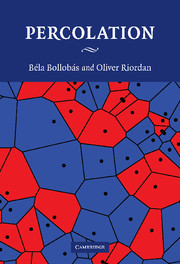Book contents
- Frontmatter
- Contents
- Preface
- 1 Basic concepts and results
- 2 Probabilistic tools
- 3 Bond percolation on ℤ2 – the Harris–Kesten Theorem
- 4 Exponential decay and critical probabilities – theorems of Menshikov and Aizenman & Barsky
- 5 Uniqueness of the infinite open cluster and critical probabilities
- 6 Estimating critical probabilities
- 7 Conformal invariance – Smirnov's Theorem
- 8 Continuum percolation
- Bibliography
- Index
- List of notation
5 - Uniqueness of the infinite open cluster and critical probabilities
Published online by Cambridge University Press: 05 June 2012
- Frontmatter
- Contents
- Preface
- 1 Basic concepts and results
- 2 Probabilistic tools
- 3 Bond percolation on ℤ2 – the Harris–Kesten Theorem
- 4 Exponential decay and critical probabilities – theorems of Menshikov and Aizenman & Barsky
- 5 Uniqueness of the infinite open cluster and critical probabilities
- 6 Estimating critical probabilities
- 7 Conformal invariance – Smirnov's Theorem
- 8 Continuum percolation
- Bibliography
- Index
- List of notation
Summary
Our first aim in this chapter is to present a result of Aizenman, Kesten and Newman [1987] that, under mild conditions, above the critical probability there is a unique infinite open cluster; Burton and Keane [1989] have given a very simple and elegant proof of this result. Together with Menshikov's Theorem, this uniqueness result gives an alternative proof of the Harris–Kesten Theorem; this proof is easily adapted to determine the critical probabilities of certain other lattices. The key consequence of uniqueness is that, under a symmetry assumption, the critical probabilities for bond percolation on a planar lattice and on its dual must sum to 1. We shall prove this, along with a corresponding result for site percolation, assuming only order two symmetry. Finally, we discuss the star-delta transformation, which may be used to find the critical probabilities for certain lattices that are not self-dual.
Uniqueness of the infinite open cluster – the Aizenman–Kesten–Newman Theorem
Throughout this chapter the underlying graph ∧ will be unoriented, and of finite-type. In other words, there are finitely many equivalence classes of sites under the relation in which two sites x and y are equivalent if there is an automorphism of ∧ mapping x to y, in which case we write x ∼ y. As usual, ∧ will be infinite, locally finite, and connected.
We start this chapter with the result of Aizenman, Kesten and Newman [1987] that, in this setting, with probability 1, there is at most one infinite open cluster.
Information
- Type
- Chapter
- Information
- Percolation , pp. 117 - 155Publisher: Cambridge University PressPrint publication year: 2006
